

Share
9th February 2018
02:00pm GMT

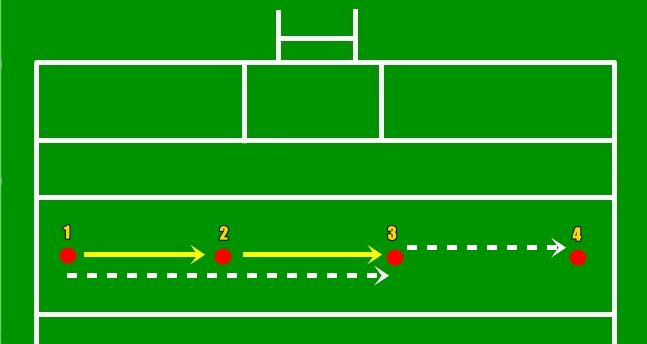 Player 1 kicks to player 3 and runs to cone 2.
Player 2 receives the ball off player 3 and kicks and follows to cone 4 and the drill reverses
It looks like there's a lot going on here but once you get into the groove of things, it's not that bad at all. Player 1 basically has a kick pass and a short run where the focus will no longer be on them. Player 3 catches and pops off and that's it until the drill reverses.
There are loads of resting areas and this drill is exactly the sort of one managers will say "sprint after the kick". That's when you know you have them.
Player 1 kicks to player 3 and runs to cone 2.
Player 2 receives the ball off player 3 and kicks and follows to cone 4 and the drill reverses
It looks like there's a lot going on here but once you get into the groove of things, it's not that bad at all. Player 1 basically has a kick pass and a short run where the focus will no longer be on them. Player 3 catches and pops off and that's it until the drill reverses.
There are loads of resting areas and this drill is exactly the sort of one managers will say "sprint after the kick". That's when you know you have them.
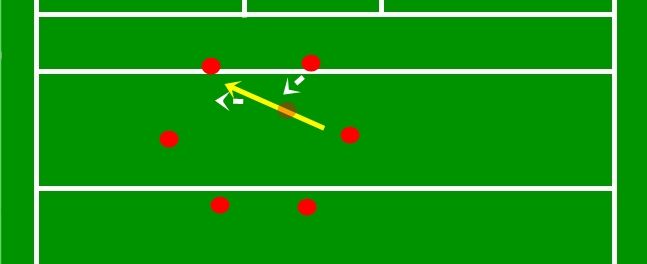 You basically just end up on the second cone away from you.
You take a hand pass and make a hand pass in between your short run.
You basically just end up on the second cone away from you.
You take a hand pass and make a hand pass in between your short run.
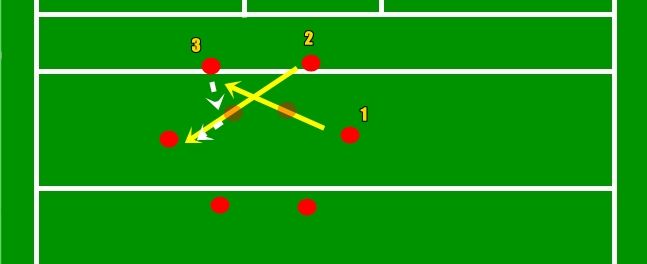 Player 2 pops to player 1 who hand passes out to player 3 and stops there.
After player 2 has popped the ball, they then take off toward the second cone away from them, taking a pass off player 3 on the way.
Player 2 pops to player 1 who hand passes out to player 3 and stops there.
After player 2 has popped the ball, they then take off toward the second cone away from them, taking a pass off player 3 on the way.
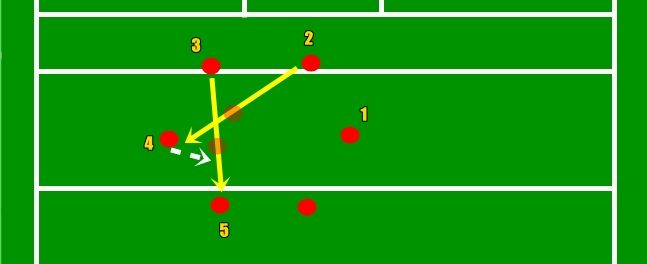 Player 3's pop then releases them and they end up at player 5 having taken possession off player 4 on the way.
It looks busy as heck but you're making short bursts before joining the back of a queue.
Player 3's pop then releases them and they end up at player 5 having taken possession off player 4 on the way.
It looks busy as heck but you're making short bursts before joining the back of a queue.
 Perhaps more popular in Ulster but, as intense as you might think it is, it's four players surrounding one.
The player in the middle throws the ball into the air and when it's caught, the four on the outside are supposed to enter and shield with hands out, big chests, keeping the guy in possession surrounded with nowhere to go.
The player in the middle is supposed to break out but everyone will be around you before the ball is even dropping back down and the manager won't say anything because he wants to prove that his defensive tactics work.
Perhaps more popular in Ulster but, as intense as you might think it is, it's four players surrounding one.
The player in the middle throws the ball into the air and when it's caught, the four on the outside are supposed to enter and shield with hands out, big chests, keeping the guy in possession surrounded with nowhere to go.
The player in the middle is supposed to break out but everyone will be around you before the ball is even dropping back down and the manager won't say anything because he wants to prove that his defensive tactics work.
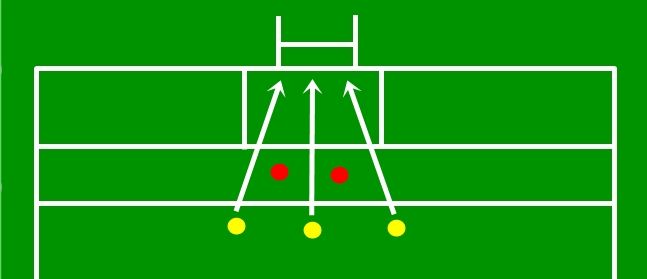 It's too easy for the forwards just to pop it to the free man and it's too easy for the defenders to use the excuse that they have no chance.
This will descend into guys trying to score Hollywood goals that they'd never try in a game - or at least you hope they wouldn't try.
It's too easy for the forwards just to pop it to the free man and it's too easy for the defenders to use the excuse that they have no chance.
This will descend into guys trying to score Hollywood goals that they'd never try in a game - or at least you hope they wouldn't try.
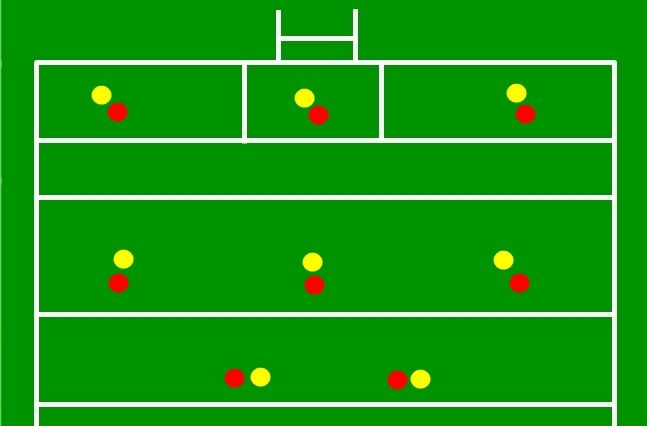 Supposed to replicate match situations but it doesn't.
Most times, the midfielders won't even be involved. They'll just stand for 10 seconds waiting for a forward to finally become free and they'll kick it in.
When they are involved, it's just one v one out there and they'll more than likely have struck up a deal of who catches which ball. No-one's in for the break, no-one's charging around like a bull, it's just floated up and they go up for the catch. If they win it, they stride in unchallenged.
Too many players run free in this. The game restarts far too quickly especially if there's no 'keeper. Players just run and grab a handy ball and take it straight back out with no-one keeping tabs on them.
Usually becomes a farce. But it's really tough...
Supposed to replicate match situations but it doesn't.
Most times, the midfielders won't even be involved. They'll just stand for 10 seconds waiting for a forward to finally become free and they'll kick it in.
When they are involved, it's just one v one out there and they'll more than likely have struck up a deal of who catches which ball. No-one's in for the break, no-one's charging around like a bull, it's just floated up and they go up for the catch. If they win it, they stride in unchallenged.
Too many players run free in this. The game restarts far too quickly especially if there's no 'keeper. Players just run and grab a handy ball and take it straight back out with no-one keeping tabs on them.
Usually becomes a farce. But it's really tough...Explore more on these topics: